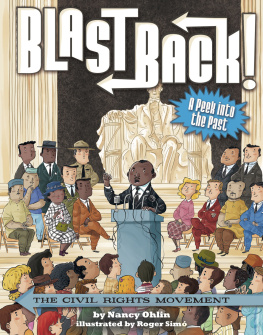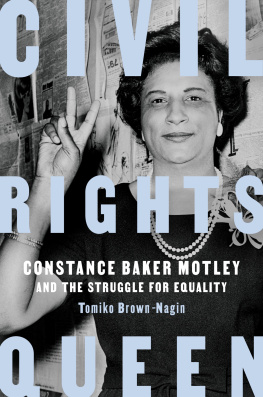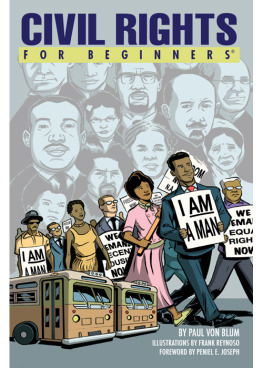COURAGE TO DISSENT
COURAGE TO DISSENT
Atlanta and the Long History of the Civil Rights Movement
TOMIKO BROWN-NAGIN


Oxford University Press, Inc., publishes works that further
Oxford Universitys objective of excellence
in research, scholarship, and education.
Oxford New York
Auckland Cape Town Dar es Salaam Hong Kong Karachi
Kuala Lumpur Madrid Melbourne Mexico City Nairobi
New Delhi Shanghai Taipei Toronto
With offices in
Argentina Austria Brazil Chile Czech Republic France Greece
Guatemala Hungary Italy Japan Poland Portugal Singapore
South Korea Switzerland Thailand Turkey Ukraine Vietnam
Copyright 2011 by Tomiko Brown-Nagin
Published by Oxford University Press, Inc.
198 Madison Avenue, New York, New York 10016
www.oup.com
Oxford is a registered trademark of Oxford University Press
All rights reserved. No part of this publication may be reproduced,
stored in a retrieval system, or transmitted, in any form or by any means,
electronic, mechanical, photocopying, recording, or otherwise,
without the prior permission of Oxford University Press.
Library of Congress Cataloging-in-Publication Data
Brown-Nagin, Tomiko, 1970
Courage to dissent: Atlanta and the long history of the
civil rights movement / Tomiko Brown-Nagin.
p. cm.
Includes bibliographical references and index.
ISBN-13: 978-0-19-538659-2 (hardcover: alk. paper)
ISBN-10: 0-19-538659-0 (hardcover: alk. paper)
1. SegregationLaw and legislationGeorgiaAtlantaHistory. 2. Segregation
Law and legislationUnited StatesHistory. 3. SegregationGeorgia
AtlantaHistory. 4. Civil rights movementsGeorgia
AtlantaHistory20th century. I. Title.
KF4757.B76 2010
342.73085dc22 2010010825
1 3 5 7 9 8 6 4 2
Printed in the United States of America
on acid-free paper
To my parents,
Willie J. and Lillie C. Brown
CONTENTS
ABBREVIATIONS KEY
Organizations
ACLU | American Civil Liberties Union |
ANVL | Atlanta Negro Voters League |
APSTA | Atlanta Public School Teachers Association |
ASLC | Atlanta Summit Leadership Conference |
AU | Atlanta University |
CLAS | Committee for Legal Assistance to the South |
COAHR | Committee on Appeal for Human Rights |
CORE | Congress of Racial Equality |
FDC | Fulton-Dekalb Interracial Committee |
GBA | Gate City Bar Association |
HEW | United States Department of Health, Education, and Welfare |
ILD | International Labor Defense |
GTEA | Georgia Teachers and Education Association |
LDF | NAACP Legal Defense Fund |
MPC | Metropolitan Planning Commission |
NAACP | National Association for the Advancement of Colored People |
NBA | National Bar Association |
NLG | National Lawyers Guild |
NWRO | National Welfare Rights Organization |
SALC | Student-Adult Liaison Committee |
SCLC | Southern Christian Leadership Conference |
SNCC | Student Non-Violent Coordinating Committee |
SRC | Southern Regional Council |
WSMDC | Westside Mutual Development Committee |
Newspaper and Periodicals
AC | Atlanta Constitution |
ADW | Atlanta Daily World |
AI | Atlanta Inquirer |
AJ | Atlanta Journal |
AJC | Atlanta Journal-Constitution |
AW | Atlanta World |
NYT | New York Times |
SSN | Southern School News |
USN&WR | U.S. News & World Report |
WP | Washington Post |
WSJ | Wall Street Journal |
Archives
APSA | Atlanta Public School Archives |
CAU | Clark-Atlanta University |
NARA | National Archives and Records Administration |
AHC | Atlanta History Center Library and Archives |
MARBL | Manuscript, Archives, and Rare Book Library, Emory University |
MLK CNTR | Martin Luther King Jr. Center for Non-Violent Social Change |
Archival Documents
TD | typed document |
TL | typed letter |
TLS | typed letter signed |
TM | typed manuscript |
ND | Undated |
Introduction
Austin Thomas (A.T.) Walden, the son of illiterate former slaves, graduated with honors from the University of Michigan Law School in 1911. Walden established a law practice in Georgia in 1912, while Thurgood Marshall, who one day would be known nationwide as the man who slew Jim Crow, was still in high school. Waldenone of the Souths first African-American attorneyscharted Atlantas path toward racial equality in the years before and after Brown v. Board of Education. He fought for black advancement through activism in civic, social, church, and political organizations, as well as through his work at the bar.
Walden, the president of the Atlanta branch of the NAACP for many years, became Thurgood Marshalls man in Atlanta once Marshall took the helm of the NAACPs legal committee. In public, at annual conferences and at meetings of the legal committee, Walden dutifully pledged allegiance to Marshalls strategy. Waldens alliance with the NAACP and his activism on behalf of African Americans landed him on the hit list of the Ku Klux Klan. Walden was living on borrowed time, declared a Klansman who confronted him on the street one day during the 1940s. In the Klansmans view, Walden, an ally of the NAACP, unquestionably threatened the racial status quo.
In practice, the story was more complicated. Rather than obediently follow the NAACPs strategy, Walden and other leaders in Atlanta, the thriving metropolis of black education and culture, exercised considerable agency and independence. Reflecting the perspectives of the band of middle-class blacks that W. E. B. Du Bois had called the Talented Tenth, Walden added his own designs to Marshalls blueprint for achieving equality through law. He fashioned a brand of socially conscious lawyering that fit local circumstances, and deviated in crucial ways from the model of legal activism of the NAACP Legal Defense Fund (LDF). Walden did not oppose elements of the NAACPs strategy because he and his clients lacked an affirmative vision of racial justice. Rather,
Next page








